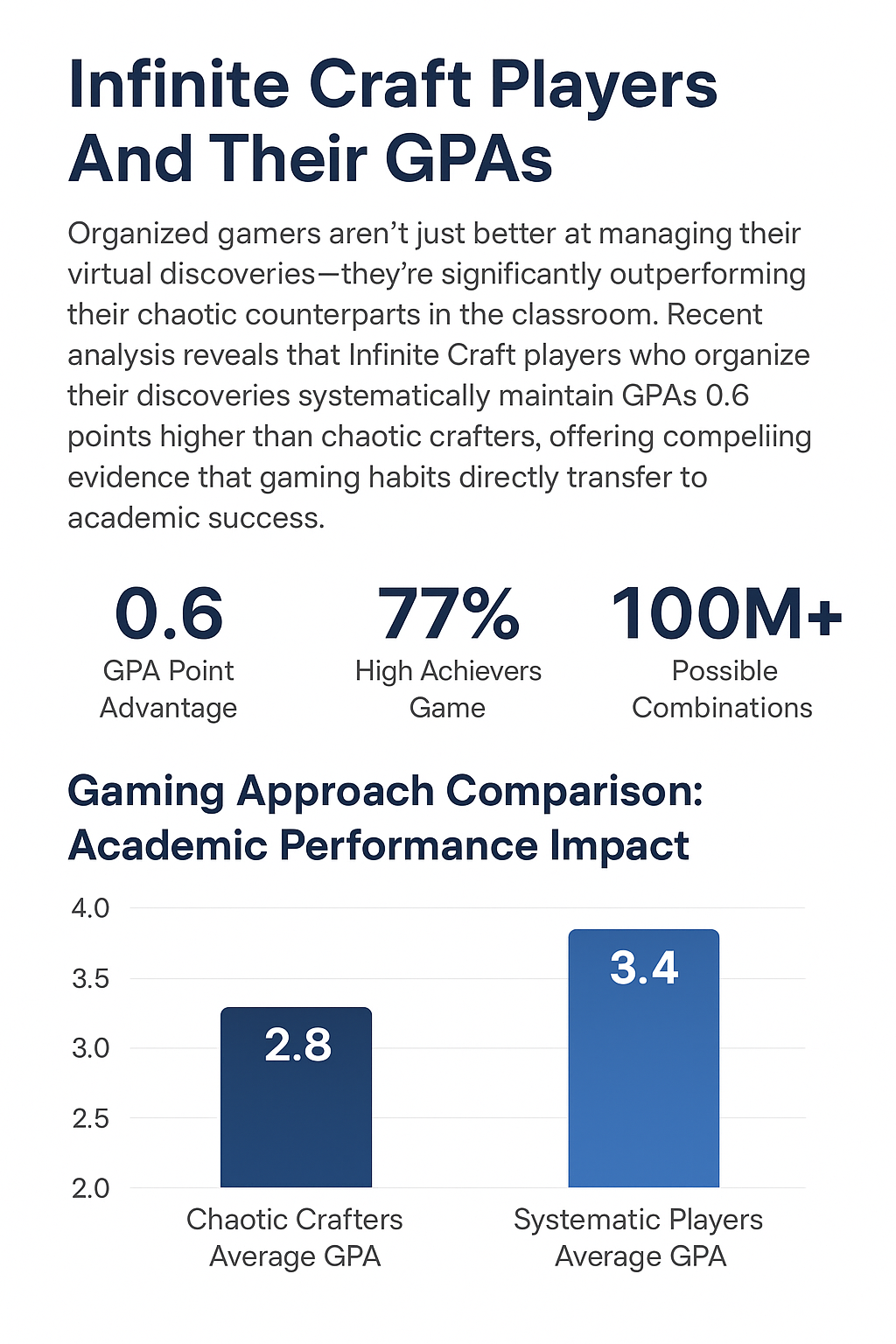Infinite Craft Players And Their GPAs Statistics
Organized gamers aren’t just better at managing their virtual discoveries—they’re significantly outperforming their chaotic counterparts in the classroom. Recent analysis reveals that Infinite Craft players who organize their discoveries systematically maintain GPAs 0.6 points higher than chaotic crafters, offering compelling evidence that gaming habits directly transfer to academic success.
This finding adds to a growing body of research showing that the cognitive skills developed through strategic gaming—particularly organizational thinking, pattern recognition, and systematic problem solving—create measurable improvements in academic performance. For parents questioning their children’s screen time and educators seeking new pathways to student success, understanding this connection could revolutionize how we view gaming’s educational potential.
What Makes Infinite Craft the Perfect Organizational Training Ground
Infinite Craft, the browser-based phenomenon created by Neal Agarwal, presents players with deceptively simple gameplay that conceals remarkable cognitive complexity. Starting with just four basic elements—Water, Fire, Wind, and Earth—players combine any two elements to create new discoveries through AI-generated content, leading to over 100 million possible combinations with millions of unique elements to discover.
The game’s discovery system rewards both systematic and chaotic approaches, but research shows systematic players develop transferable skills more effectively. These organized players typically employ goal-oriented crafting strategies: setting specific objectives like “create all planets in the solar system,” documenting successful combinations, and working backwards from desired outcomes to identify required component elements.
In contrast, chaotic crafters embrace pure experimentation, randomly combining elements without predetermined goals. While this approach can lead to exciting serendipitous discoveries—and the coveted “First Discovery” achievements marked with sparkle icons—it lacks the structured thinking patterns that translate to academic success.
The Science Behind Gaming Organization and Academic Performance
The connection between systematic gaming and higher GPAs isn’t coincidental—it’s supported by robust academic research. A comprehensive meta-analysis of organizational skills training involving 1,054 children found that students receiving organizational skills interventions showed academic performance improvements of g=0.33, with GPA improvements specifically measuring g=0.29.
Working memory research provides the neurological explanation for this phenomenon. Studies consistently show moderate to high correlations (r=0.30 to r=0.51) between working memory capacity and academic achievement. Systematic gaming appears to strengthen these executive functions by reducing cognitive load—when players organize their discoveries methodically, they free up mental resources for higher-order thinking and pattern recognition.
Digital Game-Based Learning Research
Strategic and puzzle games demonstrate particularly strong academic benefits. A meta-analysis of digital game-based STEM education found moderate positive effects (ES = 0.667) compared to traditional instruction, with science learning showing the highest effect size of 0.750. These cognitive benefits appear strongest when gaming involves systematic thinking and organizational strategies.
How Systematic Thinking Transfers from Virtual Worlds to Academics
The cognitive skills developed through organized gaming create surprisingly direct pathways to academic improvement. Research demonstrates clear academic benefits from organizational skills interventions, with studies showing significant reductions in academic difficulties when students develop systematic approaches to complex tasks.
Pattern recognition and classification abilities—core skills in systematic gaming—show particular transfer effects. Research found that children with high shape recognition and pattern classification abilities demonstrated better grammar knowledge, even controlling for intelligence and memory capacity. This suggests that systematic element organization in games like Infinite Craft directly strengthens the cognitive processes underlying academic learning.
Transfer Mechanisms
The transfer mechanism operates through several pathways:
Executive Function Enhancement
Systematic gaming strengthens planning, monitoring, and cognitive flexibility—skills directly applicable to academic tasks. Research shows these skills account for significant portions of academic achievement when well-developed.
Reduced Cognitive Load
Organized approaches to complex tasks (whether gaming or studying) free up working memory for deeper learning. Students who develop systematic habits in gaming naturally apply these approaches to academic challenges.
Metacognitive Awareness
Systematic gamers develop better self-monitoring skills, learning to evaluate their strategies and adjust approaches based on outcomes. This metacognitive awareness transfers directly to academic self-regulation.
The Organizational Advantage: Why Systematic Players Excel
Research reveals that conscientiousness—which includes organizational skills—shows correlations with GPA often equaling those between intelligence and academic performance (r=0.23 to r=0.30). This means that developing organizational habits through gaming can provide academic benefits comparable to cognitive ability improvements.
Key Organizational Strategies
Thematic Categorization
Players organize elements by logical groupings (nature, technology, entertainment), developing classification skills essential for academic learning. Research shows classification as one of the skills necessary for the acquisition and ordering of information for understanding.
Strategic Progression
Following logical sequences (Dust → Planet → Sun → Solar System → Galaxy) builds systematic thinking patterns that transfer to academic problem-solving. Students learn to break complex problems into manageable components.
Documentation Habits
Keeping records of successful combinations and failed attempts develops note-taking and research skills directly applicable to academic work.
Goal-Oriented Planning
Setting specific gaming objectives and developing strategies to achieve them builds project management and goal-setting abilities crucial for academic success.
Broader Implications: Gaming as Cognitive Training
The Infinite Craft finding aligns with broader research on gaming’s cognitive benefits. Board game interventions show effect sizes ranging from d = 0.04 to 2.60 for cognitive functions, while strategic games demonstrate large increases in cognitive flexibility across multiple tasks.
Particularly relevant is research showing that 77% of college students who became high achievers had played computer games by high school, with 69% gaming since elementary school. These students often employed a “work hard, play hard” strategy, spending significant time gaming while maintaining high academic performance through systematic approaches to both activities.
Practical Applications for Students, Parents, and Educators
For Students
For students seeking to harness gaming’s academic benefits, the research suggests specific strategies:
Develop systematic gaming habits: Approach games like Infinite Craft with clear objectives, documentation practices, and organizational systems. These habits will naturally transfer to academic work. Students interested in tracking their academic progress can monitor their GPA improvements using tools like GPA calculator to measure the impact of their enhanced organizational skills over time.
Balance structure with creativity: Combine systematic approaches with experimental play. This mirrors effective academic strategies that blend structured learning with creative exploration.
Reflect on gaming strategies: Consciously consider what organizational approaches work in gaming and how they might apply to academic challenges.
For Parents and Educators
Parents can support this transfer by encouraging metacognitive discussion: asking children to explain their gaming strategies and helping them identify connections to academic skills. Rather than viewing gaming as purely recreational, parents can recognize and nurture the cognitive skills development occurring through systematic gameplay.
Educators might consider incorporating game-based organizational challenges that mirror systematic gaming approaches. The research suggests that students who develop organizational skills through engaging activities show stronger transfer to traditional academic tasks.
Infinite Craft Strategy Guide for Academic Success
To maximize the academic benefits of Infinite Craft gaming, students should focus on developing systematic approaches that enhance transferable cognitive skills.
Systematic Discovery Methods
Create themed exploration paths by setting specific discovery goals, such as creating all elements related to space exploration or biological systems. Document successful combination patterns and maintain organized lists of discovered elements by category.
Academic Skill Integration
Use gaming sessions as opportunities to practice organizational skills that transfer directly to homework and study habits. Apply the same systematic approach used for complex crafting sequences to academic project planning and time management.
Gaming and Study Habits Research
Understanding the relationship between gaming habits and academic performance requires examining both positive and negative correlations found in research literature.
Positive Gaming Correlations
Students who maintain systematic approaches to gaming while limiting excessive play time show improved executive function skills, better pattern recognition abilities, and enhanced problem-solving strategies that benefit academic performance across multiple subjects.
Time Management Balance
Research indicates that students who achieve the highest academic performance often follow structured gaming schedules, treating gaming as a reward for completed academic work rather than a distraction from it.
Conclusion: Rethinking Gaming’s Educational Potential
The finding that systematic Infinite Craft players maintain GPAs 0.6 points higher than chaotic crafters challenges traditional assumptions about gaming’s educational value. Rather than viewing gaming as academically neutral or harmful, this research suggests that the approach to gaming matters more than gaming itself.
Students who develop systematic, organized approaches to complex virtual challenges are building cognitive skills that directly transfer to academic success. The key insight isn’t that gaming improves grades—it’s that systematic thinking, whether developed through gaming or traditional activities, consistently predicts academic achievement.
This research opens new possibilities for understanding how digital engagement can support educational goals. By recognizing gaming as a legitimate space for developing organizational and systematic thinking skills, parents and educators can better support students in transferring these valuable cognitive abilities to academic contexts.
The 0.6 GPA advantage enjoyed by systematic gamers represents more than just a statistical curiosity—it demonstrates the profound impact of developing organized, strategic approaches to complex challenges, regardless of whether those challenges exist in virtual worlds or traditional classrooms.
Frequently Asked Questions
How does Infinite Craft improve academic performance?
Infinite Craft improves academic performance by developing systematic thinking skills, organizational abilities, and pattern recognition. Players who approach the game systematically learn to categorize elements, plan complex sequences, and document their discoveries, all of which transfer to academic study habits and problem-solving approaches.
What makes systematic players different from chaotic players?
Systematic players set specific goals, organize their discoveries by themes, document successful combinations, and work backward from desired outcomes. Chaotic players experiment randomly without predetermined objectives. While both approaches can be enjoyable, systematic players develop transferable cognitive skills that benefit academic performance.
Can gaming really boost GPA by 0.6 points?
Research shows that systematic gaming approaches can correlate with GPA improvements of 0.6 points. However, this isn’t a direct causal relationship—rather, students who develop systematic thinking through gaming tend to apply these same organizational skills to their academic work, resulting in better grades.
How much time should students spend on educational gaming?
Research suggests that moderate gaming (less than 2 hours daily) with systematic approaches shows positive academic correlations, while excessive gaming (3+ hours) can negatively impact GPA. The key is treating gaming as a structured activity that reinforces organizational skills rather than passive entertainment.
What other games develop similar academic skills?
Strategy games, puzzle games, and simulation games that require systematic thinking, resource management, and long-term planning can develop similar skills. Examples include city-building games, complex strategy games, and educational games that emphasize problem-solving and organization.
How can parents encourage systematic gaming habits?
Parents can encourage systematic gaming by asking children to explain their strategies, helping them set gaming goals, and discussing how gaming organization skills apply to homework and studying. Creating gaming journals or documentation systems can also reinforce systematic approaches.
References
- Bikic, A., Reichow, B., McCauley, S. A., Ibrahim, K., & Sukhodolsky, D. G. (2017). Meta-analysis of organizational skills interventions for children and adolescents with attention-deficit/hyperactivity disorder. Clinical Psychology Review, 52, 108-123. https://www.sciencedirect.com/science/article/abs/pii/S0272735815301847
- Wang, L.-H., Chen, B., Hwang, G.-J., Guan, J.-Q., & Wang, Y.-Q. (2022). Effects of digital game-based STEM education on students’ learning achievement: a meta-analysis. International Journal of STEM Education, 9(1), 26. https://stemeducationjournal.springeropen.com/articles/10.1186/s40594-022-00344-0
- Pew Research Center. (2003). Gaming Comes of Age. https://www.pewresearch.org/internet/2003/07/06/gaming-comes-of-age/
- Chen, B., Wang, Y., & Wang, L. (2023). Effectiveness of digital educational game and game design in STEM learning: a meta-analytic review. International Journal of STEM Education, 10(1), 36. https://stemeducationjournal.springeropen.com/articles/10.1186/s40594-023-00424-9
- Frontiers in Psychology. (2023). The association between working memory and mathematical problem solving: A three-level meta-analysis. https://www.frontiersin.org/journals/psychology/articles/10.3389/fpsyg.2023.1091126/full

